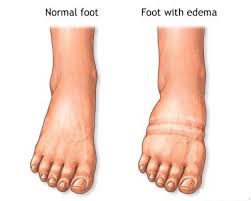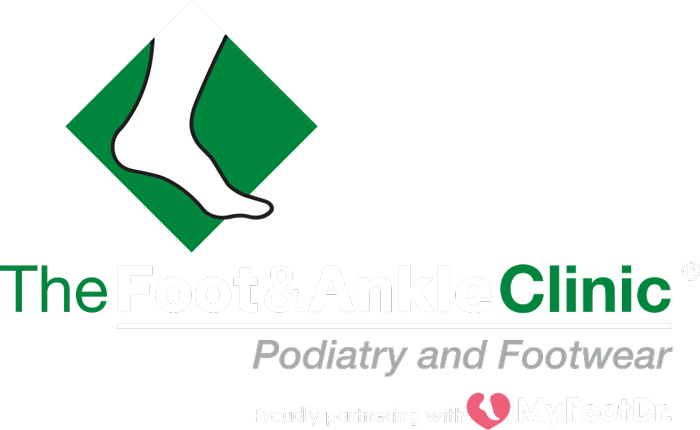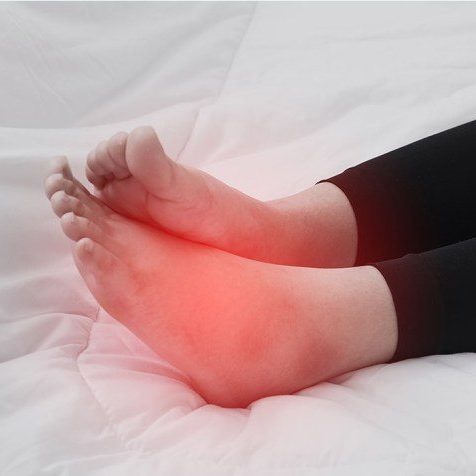Oedema – Hot and Swollen Ankles and Feet
Swelling in the feet, otherwise referred to as oedema, occurs as a result of a wide range of causes, including the body’s reaction to hot weather, a high salt intake, pregnancy, and the hormones associated with the menstrual cycle. Oedema can be symptomatic of serious medical conditions such as heart, kidney or liver disease.
Fluid retention (oedema) may be caused by many different conditions. Oedema may be due to having to spend a long time sitting or having to stay in bed (immobility). Varicose veins and pregnancy are also common causes of oedema.
Increased blood volume, extra pressure on the blood vessels in the legs and pelvis and increased water retention all have an effect.
Women are more prone than men to fluid retention (oedema). Female hormones (progesterone) tend to cause fluid retention so some women notice puffy ankles just before a period. Oedema may occur for the first time at any age if you have an allergic reaction or become anaemic.
Older people can develop oedema, as they sit for long periods of time. They are also more likely to have underlying heart or kidney conditions that may cause oedema.
Medical conditions that may cause fluid retention
Fluid retention may be a symptom of serious underlying conditions, including:
- kidney disease – such as nephrotic syndrome and acute glomerulonephritis
- heart failure – if the heart does not pump effectively, the body compensates in various ways. it starts to retain fluid and increase the volume of blood. This results in congestion of the veins, enlargement of the liver, and the accumulation of fluid in body cavities like the abdominal cavity (ascites) and in subcutaneous tissues, causing swelling (oedema) of the legs
- chronic lung diseases – such as severe emphysema, which put excessive pressure on the heart’s right ventricle, leading to its failure
- liver disease – such as severe cirrhosis that triggers liver failure
- malignant lymphoedema – cancerous tumours that block structures of the lymphatic system, such as the lymph nodes
- thyroid disease – such as hypothyroidism
- arthritis – joints affected by some types of arthritis tend to swell with fluid
- allergic reaction – in susceptible people, the body tends to swell in response to particular allergens, such as an insect bite. In some cases, the reaction is severe (anaphylaxis) and requires urgent medical attention. this swelling is short-lived rather than ongoing
- autoimmune diseases such as lupus.

Treatment for fluid retention
Depending on the cause, treatment may include:
- a low-salt diet
- diuretics (water pills)
- treatment for the underlying medical condition: for example, hormone replacement (thyroxine) in the case of hypothyroidism
- lifestyle changes in response to the underlying medical condition: for example, avoidance of alcohol if liver disease is the cause
- changes to medication or dosage, if drugs are the cause
- dietary adjustments, if malnutrition is the cause
Swelling in the feet can be minimized by the following methods:
- Elevate your feet as often as possible. If you have to sit for long periods of time, place a small stool by your feet to elevate them.
- Wear proper fitting footwear. Footwear that is too narrow or short will constrict circulation.
- Wear seamless socks that do not constrict circulation such as those designed for diabetics.
- Compression garments and hosiery can prevent excessive fluid retention and oedema as well as provide needed support while preventing muscle fatigue and aiding recovery.
- If you are driving for a long period of time, take regular breaks to stretch your legs to promote circulation.
- Exercise regularly to promote overall health; walking is the best medicine.
- Drink plenty of water to keep the body hydrated. This helps the body retain less fluid.
At the Foot and Ankle Clinic our highly qualified team of Podiatrists are all members of the Australian Podiatry Association and offer a combined 50 years’ experience. They are trained to diagnose and effectively treat Oedema and hot, swollen feet via a range of treatments.
Put your feet in our hands! See us today in Chadstone, East Bentleigh, Moe, Sale, Traralgon, Warragul & Online Store and Retail Enquiries. NO REFERRAL NEEDED!.


